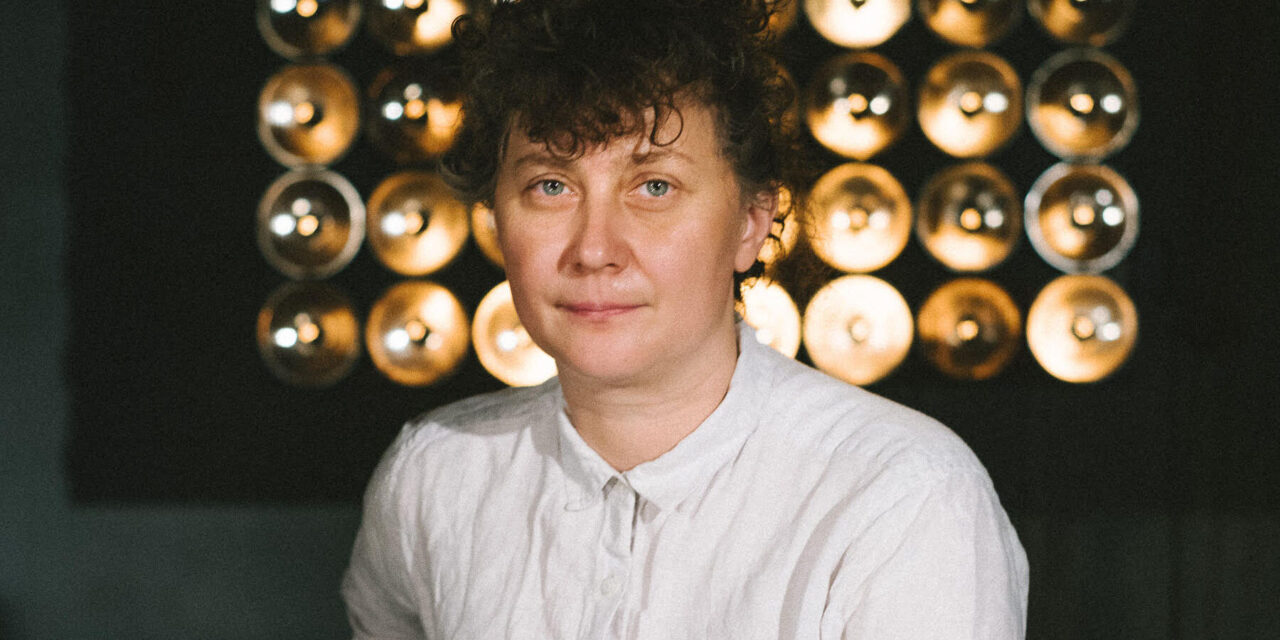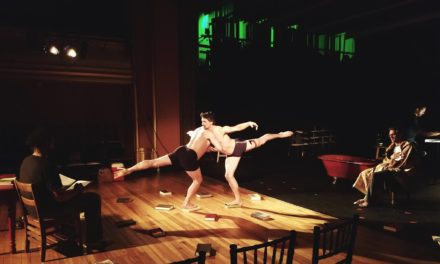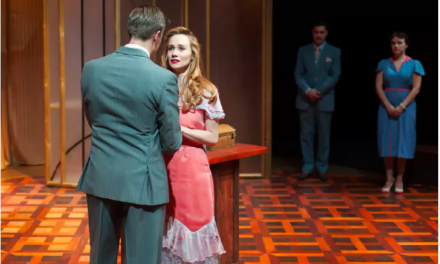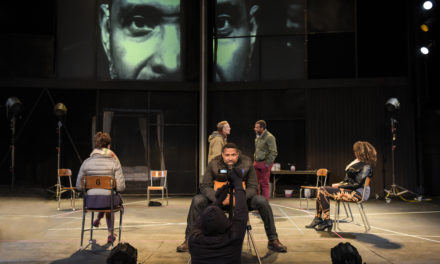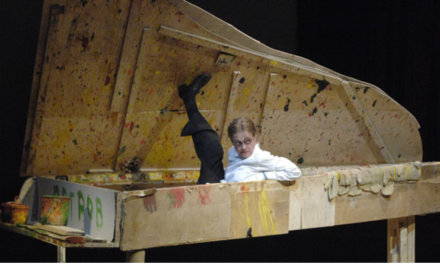Moldovan playwright and director Nicoleta Esinencu is known for her provocative monologue FUCK YOU, Eu.ro.Pa. Tom Mustroph talks to her about Symphony of Progress, her new production for Berlin’s HAU; Teatru-Spalatorie, her independent theatre in Chisinau; and the complicated relationship between Eastern Europe and the West.
For more than a decade now, Nicoleta Esinencu has been labelled the “angry women from Moldova.” In her plays FUCK YOU, Eu.ro.Pa., Dear Moldova, can we kiss just a little bit? and The Rest of Europe, the playwright from Chisinau talks about the exploitation of Eastern Europe by the West, about the patriarchy, nationalism and homophobia in Moldova. Since 2011, together with her production manager and problem solver Nora Dorogan, she has run the independent company Teatru-Spalatorie in Moldova’s capital Chisinau. SEEstage had the chance to meet both of them during rehearsals for her new production Symphony of Progress, which premieres on January 13 at HAU in Berlin.
Tom Mustroph: Looking at your past performances, one might imagine you have made a lot of enemies. Is this the case and, if so, which ones have been the worst?
Nicoleta Esinencu: It’s not me who chooses the enemies. They were already here when I was born. It’s not as if any one is more important than another. Capitalism, the patriarchy and the current [state of] politics of Europe are all connected and therefore we have to destroy them all and hope that, if one collapses, then another will collapse too.
TM: What is the probability of winning [this fight]?
Esinencu: (laughs) I still hope. But it is not about winning. It is more about talking, identifying problems and building small communities just to survive.
TM: And is theatre the kind of space where you can find or create those communities?
Esinencu: Yes, but theatre is also very capitalist and homophobic. That means we need to build these small communities in the arts as well.
TM: That sounds scary, that there are enemies inside that thing – theatre – that you have chosen as a tool to create hope?
Esinencu: (laughs) Yes, they are everywhere and they control everything. It sounds like a conspiracy theory, but it is reality.
TM : You now have a residency with the German arts exchange organisation DAAD here in Berlin and are also producing work at HAU. Is the density of enemies higher here in Berlin or in Chisinau?
Esinencu: They are everywhere. When East Europeans are picking the spargel (German word for asparagus) here, the problems are here. When Mercedes is building cars in Moldova without paying people well, then the problem is there.
During my residency here, I could see the problems more sharply. During the pandemic I was [stuck] here. At the same time there were people traveling from Eastern Europe to Germany because German companies were sending charter flights to Romania and other Eastern European countries to have workers to pick the spargel and strawberries.
TM: Do those issues show up your current play Symphony of Progress?
Esinencu: Yes. It is about the complicated relations between East and West and about what we call modern slavery.
TM: What precisely do you mean by “modern slavery”?
Esinencu: What it is to have these jobs in Western Europe, in agriculture or in slaughter houses, in Amazon delivery, in construction. All these jobs are paid below minimum salary, the employers do not respect the laws about working conditions, on spargel fields they even take the passports of the workers. These people live in unbelievable conditions, 10 people in one container, without access to anything.
TM: I notice you often use the German word for asparagus: spargel. Is that an indication how wide-spread work on the asparagus fields around Berlin is already for East European people?
Nora Dorogan: This was the case during the pandemic. Mostly we saw people coming from Romania, but a lot of Moldovan citizens hold Romanian passports. As Moldavians they cannot travel easily, but they can with a Romanian passport and around one third of Moldova’s population holds Romanian passports. [When] they came to Germany during the pandemic, they were supposed to spend 10 days in quarantine, they were not allowed to move from that place and nobody cared if they had food.
Esinencu: There is another story in Symphony of Progress about a translator working in the Moldovan parliament. During the pandemic, she lost the job and she had to do something else to survive. She went to Finland to pick cucumbers. She expected to meet nice people, but it was a disaster. She even wrote a letter to the prime minister to complain about the situation.
TM: In Chisinau you founded your own company, Teatru-Spalatorie, which means laundry in English. Why did you call it “laundry” and what have you washed there so far?
Esinencu: It was an easy [choice]. The space was a former laundry.
TM: Did you chose the name Spalatorie because you wanted to wash society? And has society become cleaner as a result?
Dorogan: I think it’s more that we wash dirty laundry in public.
TM: You programmed music, including punk and grunge events, alongside theatre. What was the intention here?
Esinencu: It was a small space with a theatre and bar. The idea was to have a bar to pay the rent. Then we organized parties and concerts, discussions, and all kind of events. For us, it was important to create something new and different, to build a nice place where people can feel safe and learn something together.
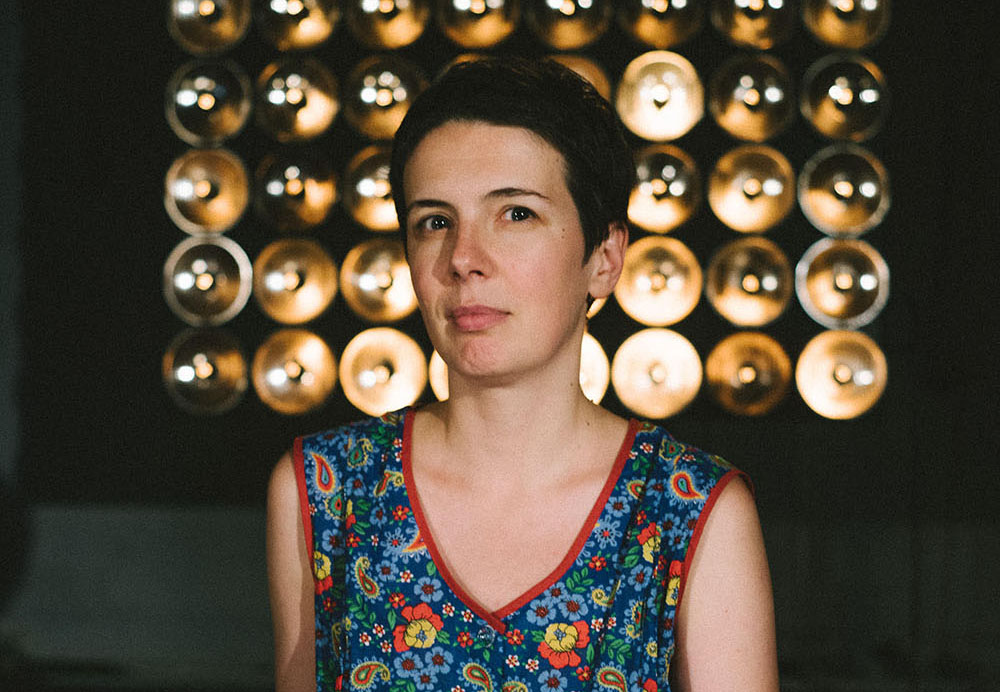
Nora Dorogan. Photos: Ramin Mazur.
TM: I read an interview with DJ Codec, who performed at your place in which he said that in your theatre he found the highest rate of kindness and respect per square meter. How did you manage this given you are framed as an “angry women from Moldova”?
Esinencu: Why be angry to nice people? The problem is not the people, but the system. I only write about what I see. But if other people see that as angry, OK.
Dorogan: As long as we had this space, there was a continuity. For seven years, Teatru-Spalatorie had a real impact on life in Chisinau, especially the young. We wanted to build something there that we dreamt of and that we wanted to have for us. We wanted to have our own productions, but also to invite artists and to support and promote the contemporary scene in Moldova, including the visual arts. Even Moldovan migrant artists came there and were promoted. We had public discussions on feminist issues, on social justice, on queer topics. [The space] was also very important for the queer community. In one of the first discussions when we opened the bar, we made it clear that we don’t accept nationalist, racist, and homophobic discourse.
TM: Have you found a new base in Chisinau?
Esinencu: No. We have to rent a space to perform and to rehearse. Now, we are fighting with the state institutions because they ask for incredibly high rent. In one space, they even received a call from the Ministry of Culture telling them: “Can you raise the rent so that Spalatorie cannot afford it?” It’s like this. It is a very strange attitude, because all the state theatres have spaces and they don’t do much [with them]. During the pandemic, they did not even use their infrastructure to invent something.
TM: So even though you are an internationally acclaimed artist, which should benefit the Ministry of Culture in Moldova, you encounter obstacles instead of funding?
Esinencu: Yes. We do not have any financial support from the institutions in Moldova. Our support comes from abroad. And I don’t even think the Ministry see what we are doing as art. The politics of our government are quite strange, everything is concentrated on tourism. The ministry is even called Ministry for Culture and Tourism.
Dorogan: Just to give you an example about the priorities, for the Christmas market the ministry had a budget of 8 million lei (around 400.000 euros) this year. The budget for supporting the independent scene in Moldova for the whole year was 5 million lei (around 250.000 euros). And this is from the new pro-European government.
TM: Moldova is a very young state. Since it emerged from the Soviet Union, there has been growing nationalist issues. It is also separated into Moldova and the pro- Russian Transnistria. How important are these nationalist and identity issues nowadays?
Esinencu: It is a hard issue, but people also play with it. You must not forget that our gas comes from Russia. And it gets more and more expensive. The pressure from the two sides, from Russia in the East, and NATO in the West is a big problem. When we look to Ukraine and the conflict there, we always ask ourselves when it will start again here?
TM: The Transnistrian conflict resembles the Ukraine conflict with the Crimea and the Donezk region, only that it began much earlier.
Esinencu: (laughs) In a lot of countries it happened before Ukraine. In Moldova and Georgia for instance. Ukraine was the last. When it began in Ukraine, we had this strange feeling that if they had looked at what happened in all these neighbouring countries maybe they would have understood how to avoid this crisis. The dynamics were always the same, it started with provocation, with all these discourses about language and anti-Russian ideology.
TM: Given that, what you would expect from Europe now in situations like this?
Esinencu: I said once that I don’t care from which side the tanks come, from the Eastern part or the Western part. They both have tanks and I am living here. We are stuck between those powers, but we have to learn to be independent.
TM: To maintain a good distance from those powers and go your own way?
Esinencu: Yes, but that is complicated, because there are always interests.
Dorogan: I would like to explain it with an example which is not about Europe, but the US. America now supports the production of movies and TV shows in Moldova. The idea is to reduce the influence of the propaganda offensive from Russia. A lot of people used to speak Russian, we were raised with it, and it is part of who we are. And now, with the support of the United States and also Europe, we produce very bad quality movies: sexist, homophobic, and racist. And people watch these!
Esinencu: It is also dangerous because people see these sexist, misogynist, and racist movies and TV shows, and they read that it was produced with the support of the United States. So people think: They make jokes about gay people, which means that it is OK to be homophobic.
TM: East–West relations are even more crazy than I thought.
Dorogan: Here is one last example of the priorities of the West in our countries. We are living through a pandemic, but the European Union is giving us money for the military. We do not know how to survive, but they give us money for armament.
TM: What are your connections with other Eastern European countries? Do you perform there?
Esinencu: We have friends in the independent scene in Romania and they invite us there when they have money. With other countries it is difficult. We went once to Kiev, but that’s it. And that was for Gay Pride. The queer community invited us, not a theatre. In Soviet times, propaganda and cultural exchange were well organized. After the collapse, everything was destroyed, including the cultural cooperation. Then came the new propaganda and this was against Russians and against the Russian language. This was the generation of our parents. They lost everything and hade no time to care about culture. Now I check what [work is being made] in Ukraine as well as in Russia and Georgia. And if I have the possibility to see something, I do, but this is mostly when they are performing in Germany. The problem is that, in most of these countries, there is no big independent scene and not much political theatre.
TM: Symphony of Progress seems to be an ideal production to tour the region because the themes can be found everywhere in Eastern Europe. Do you have plans to bring it there?
Esinencu: We prefer to bring the message of the performance to the West. After Berlin, we will go to Stuttgart and Dresden. It is also important for us to perform in Chisinau. I like to work here at HAU, but I would also like to work in decent conditions at home. I would prefer to spend 70 percent of my time working at home and 30 percent abroad. We are trying to build something in Chisinau, and maybe someone young will come and continue this.
Symphony of Progress opens at HAU, Berlin, on 13th January 2022
This article was originally published to SEEstage on January 4, 2022, and has been reposted with permission. To read the original article, click here.
This post was written by the author in their personal capacity.The opinions expressed in this article are the author’s own and do not reflect the view of The Theatre Times, their staff or collaborators.
This post was written by Tom Mustroph.
The views expressed here belong to the author and do not necessarily reflect our views and opinions.

